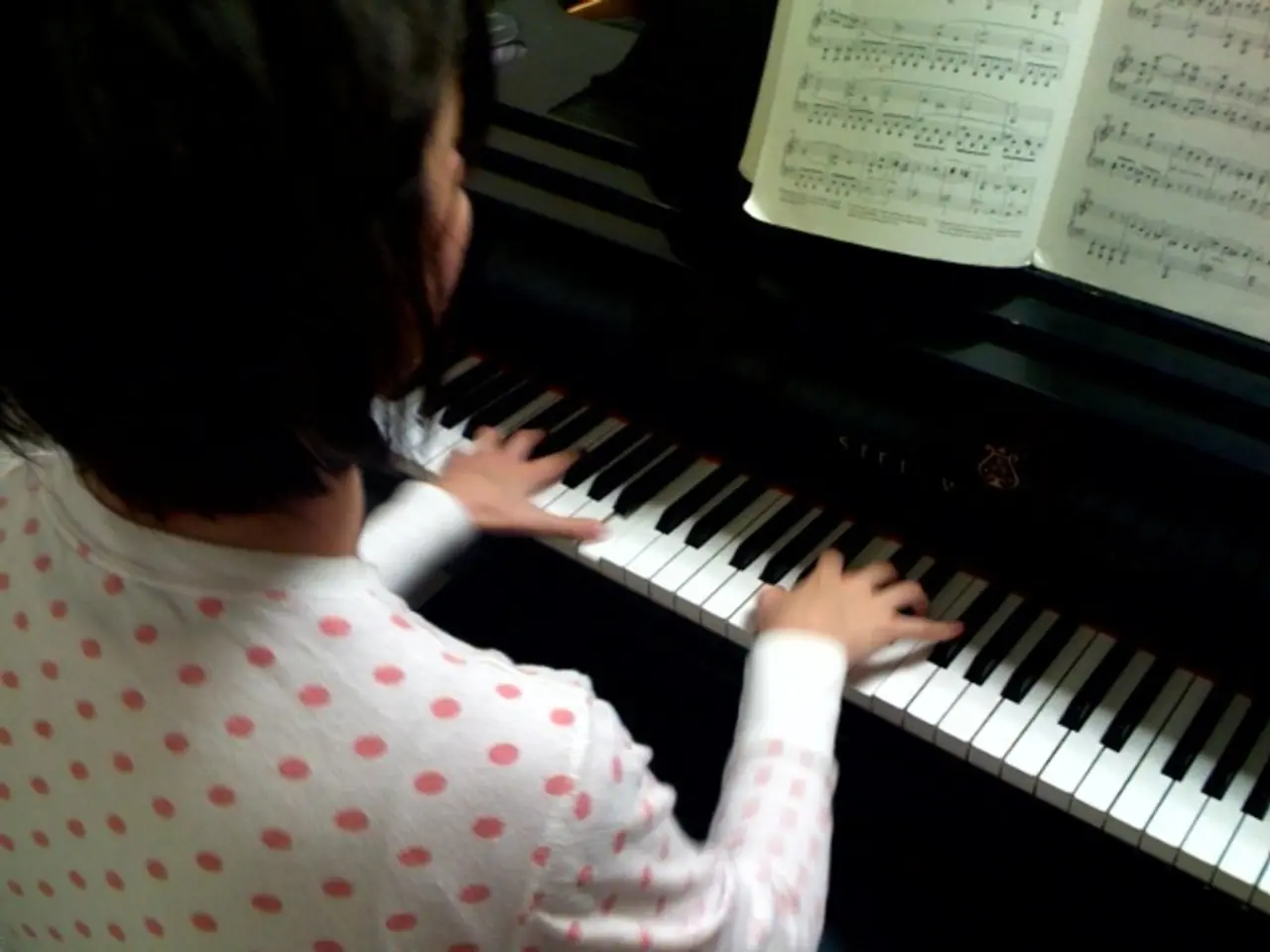Transforming the Mind through Musical Instrument Playing and Brain Rewiring
Play Some Tunes, Reset Your Mind:
Strum a guitar, tickle the ivories on a piano, or bow a violin, and watch as your brain rebels against monotony and starts transforming. It's like a magic trick happening inside your skull-notes, rhythms, and motor movements synchronizing across various neural domains. Over time, these spirited sessions aren't just about honing your instrument skills. They're about rewiring your brain itself.
Musical training is a mighty force driving neuroplasticity, the brain's capacity to adapt and reshape. From a boosted memory bank to improved focus, emotional intelligence, and coordination, playing an instrument triggers a symphony of mental skills that extend beyond the realm of music. Unsurprisingly, musicians often emerge with brains that boast remarkable differences compared to their non-musician counterparts.
Today, we delve into the intricacies of how playing music impacts your brain, how it morphs as you become a virtuoso, and how lifestyle factors help nurture this awesome transformation. Let's get started, shall we?
Your Brain on Music: A Neurological Dance Party
Music is one of the few activities that lights up virtually every part of your brain. It's an integrative task involving auditory processing, motor coordination, spatial awareness, memory, and emotion.
Rhythms in Sync: Auditory and Motor Dance
When you're jamming, your auditory cortex (the area responsible for sound perception) teams up with the motor cortex (command central for movement). This harmony is especially finely-tuned in musicians, resulting in heightened sensitivity to rhythm, timing, and pitch-all while physically executing precise movements.
This continuous communication builds stronger connections within brain regions, particularly in the corpus callosum, the bridge connecting left and right hemispheres.
The Right and Left Brain Jive: Teamwork makes the dream work.
Music often fosters more robust communication between the logical left hemisphere and the creative right hemisphere. This collaboration supports not just musical prowess but also enhanced problem-solving, abstract thinking, and emotional regulation.
Think of it as boosting your brain's internal Wi-Fi-the signal gets stronger, clearer, and more coordinated.
Practice Makes Brain Pathways
Repetition is the key to this incredible transformation. With each scale, chord, or song you practice, you're strengthening specific neural circuits. Over time, tasks that once seemed Herculean become a cakewalk, thanks to the development and refinement of these pathways.
Neuroplasticity Takeover: Wiring a Better Brain
Neuroplasticity is the brain's response to experience. As you repetitively hammer away at your instrument, synapses involved in that skill get stronger. In musicians, this process results in:
- Thickened regions of the brain controlling auditory and motor responses
- Enhanced memory and focus
- Increased ability to process complex patterns and anticipate changes
Even beginners start witnessing these changes after just a few months of consistent practice.
A Morning Routine for the Mind: Focus, Memory, and Cognitive Control
Musicians excel when it comes to tasks involving working memory (keeping and manipulating information) and cognitive flexibility (shifting between tasks or ideas). These skills are honed during practice sessions that necessitate constant attention, adjustments, and coordination of multiple stimuli.
The Emotional Brain's Symphony
Music isn't merely about technique; it's an emotional experience. The limbic system, responsible for the brain's emotional regulation, plays a crucial role in musical expression and interpretation. This close relationship is part of the reason why music has such a powerful impact on our feelings.
Empathy and Social Intelligence: Shared Harmonies
Ensemble playing teaches musicians to empathize with one another, anticipating and responding to their fellow musicians' cues. Research suggests that musicians often score higher in empathy and social sensitivity. This heightened emotional intelligence will ripple positively in their daily lives, aiding communication and relations.
Stress Release: Therapeutic Tunes
Music has a calming effect on the nervous system. Playing an instrument can decrease cortisol levels, lower anxiety, and induce a state of flow, also known as a "optimal experience"-a focus that feels both energizing and restorative. This makes music not just a means for fun but also a potent strategy for mental health and wellness.
Late Bloomers: The Brain Never Stops Changing
It's a common misconception that musical training only reshapes young brains. While it's true that childhood is a sensitive period for neuroplastic growth, adults can still reap substantial cognitive and emotional benefits from learning an instrument.
The Brain's Adaptability: Forever Growing
Adults who take the plunge and begin playing an instrument, even at an older age, still record brain volume increases, improved memory, and heightened coordination. The secret ingredient? Consistency. Just like with any new skill, regular practice equals adaptation.
Aging Gracefully: Music as a Cognitive Cloak
Older adults who play music typically perform better in cognitive assessments, including memory tests, processing speed evaluations, and measures of executive function. Music can potentially protect the elderly against cognitive decline by maintaining strong neural networks and encouraging lifelong learning.
It's never too late to let your brain rock out.
Brain Boosting: Lifestyle and Nutrition
As with any cognitive endeavor, leaning into musical learning requires brain power. Supporting that mental prowess with rest, nutrition, and wise supplements can make the practice more effective and gratifying.
Nootropics for Musicians and Learners
- Citicoline: Boosts focus and supports the synthesis of brain cell membranes, optimizing memory and cognitive speed.
- Phosphatidylserine: Enhances neuron structure and communication, aiding memory and coordination.
- L-theanine: Promotes calm focus, especially beneficial during practice or performance.
- Bacopa Monnieri: Historically utilized for learning and memory, particularly for high-cognitive-load activities.
While no supplement can catapult you to Julliard overnight, many find nootropics helpful in sustaining mental clarity and combating fatigue during prolonged learning phases. Paired with adequate sleep, hydration, and healthful meals, they can facilitate the evolution of your musical brain.
Your Brain In Notes: Evolved by Music
Every time you play an instrument, you're revamping your brain. Neural circuits fire, strengthen, and reorganize in response to every melody, challenge, and breakthrough. Over time, this dynamic interplay shapes not just better musicians, but sharper thinkers, more empathetic communicators, and more resilient learners.
Whether you're playing for joy, expression, or mental growth, remember this: with every session, you're collaborating with your brain's architect, crafting a brain that is not just amazing-but fantastic.
- The intricacies of music's impact on the brain extend beyond mere auditory perception, encompassing areas like education-and-self-development, as it encourages abstract thinking, problem-solving, and emotional regulation.
- Practicing a musical instrument promotes personal-growth by strengthening neural circuits involved in focus, memory, and cognitive control, thereby aiding learning and self-development.
- Engaging in musical activities isn't just about the notes and rhythms; it can contribute to health-and-wellness, helping to reduce stress levels, inducing a state of flow, and improving mental health by fostering empathy and social intelligence.







